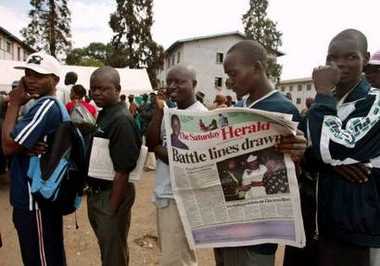|
Zimbabwe: Early results show Mugabe's party wins
(AP)
Updated: 2005-11-28 09:01
Zimbabwe's ruling party cemented its grip on power Sunday, sweeping an
overwhelming majority of seats in a new Senate amid bitter and potentially
irreconcilable divisions in the main opposition group.
Partial results from Saturday's vote gave President Robert Mugabe's ruling
Zimbabwe African National Union-Patriotic Front at least 49 of 66 seats in the
Senate.
Voting was marked by a record-low turnout blamed on voter apathy and the main
opposition leader's call for a boycott.
Independent monitors predicted a turnout of between 15 and 20 percent of
eligible voters, the lowest in any national election since Zimbabwe won
independence in 1980.

Residents queue up to vote in controversial
elections for a new Senate in the capital Harare, Zimbabwe November 26,
2005.[Reuters] | "Turnout was very low indeed. It is a vote of no confidence in the entire
process," said Reginald Matchaba-Hove, head of the independent network that
monitors Zimbabwean elections.
The election campaign left the main opposition Movement for Democratic Change
bitterly split, threatening to destroy the only group to have seriously
challenged Mugabe's increasingly autocratic 25-year rule.
Senior members of the opposition party rejected leader Morgan Tsvangirai's
calls for an election boycott and fielded 26 candidates. Tsvangirai had argued
that participation would lend credibility to a ballot that was certain to be
flawed.
Partial results indicated many voters stayed home and Tsvangirai thanked
supporters for "heeding our call for the boycott of this meaningless election."
"We have been vindicated," he said.
The boycott disagreement kept the party in disarray Sunday, as the leader's
deputy said that its disciplinary committee had barred Tsvangirai from party
offices and demanded he return all party materials and property.
Tsvangirai responded that the ban violated the party's procedures and
constitution.
Mugabe's supporters ran unopposed for 35 of the Senate's 66 seats. Results
from 19 of the 31 contested races had Mugabe's party winning 14 and Tsvangirai's
party five.
The ruling party won all three seats in traditionally unfriendly Harare,
suggesting that many opposition voters in the capital heeded Tsvangirai's
boycott call.
Nearly 60 percent of registered voters participated in parliamentary
elections last March.
Mugabe abolished the Senate in 1990 but decided to recreate it earlier this
year in what critics said was an attempt to increase his power by packing
Parliament with allies.
Many critics questioned the costs of establishing a second chamber at a time
of acute shortages of food, gasoline and other essentials during the country's
worst economic crisis since independence from Britain. The often-violent seizure
of thousands of white-owned commercial farms, coupled with erratic rains, has
crippled Zimbabwe's agricultural economy.
|